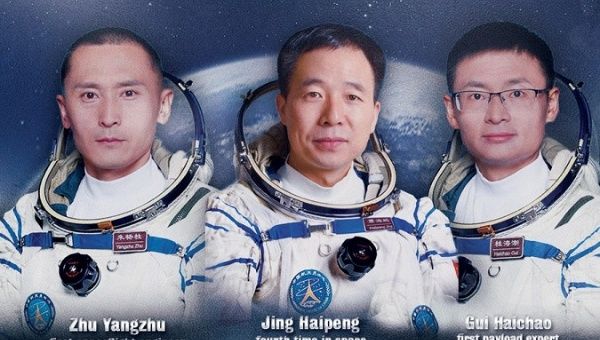Virendra Pandit
New Delhi: China on Tuesday sent three astronauts to its Tiangong Space Station, including the first civilian, into Earth’s orbit, ahead of its plans to send a crewed mission to the Moon by 2030.
Tiangong means “Heavenly Palace.”
China plans to send two crewed space missions to Tiangong every year. The next will be Shenzhou-17, with an expected launch in October, the media reported.
The Shenzhou-16 crew took off atop a Long March 2F rocket from the Jiuquan Satellite Launch Centre in northwest China at 9:31 am (0131 GMT).
Trying to catch up with the US and Russia, China has invested billions of dollars in its PLA-run space program.
Zou Lipeng, Director of the Jiuquan Satellite Launch Centre, said the launch was “completely successful” and that the “astronauts are in good condition.”
Leading the Shenzhou-16 crew are Commander Jing Haipeng, who is on his fourth mission, and engineer Zhu Yangzhu. Beihang University Professor Gui Haichao is the first Chinese civilian in space.
China was the third country to put humans in orbit, and Tiangong Space Station is key to the space program, which has also landed robotic rovers on Mars and the Moon.
Shenzhou-16, the first mission to Tiangong since it entered its “application and development” stage, will dock at the space station’s Tianhe core module. It will conduct several experiments during the mission, including in “high-precision space time-frequency systems,” general relativity, and into the origin of life.
The crew will then relieve their three colleagues from the previous Shenzhou-15 flight. They will return to Earth after six months.
Prior to the Shenzhou-16 launch, the Tiangong Space Station was resupplied with drinking water, clothing, food, and propellant this month.
Plans for China’s “space dream” got a fillip under President Xi Jinping. It is planning to build a Chinese base on the Moon.
“The goal is to achieve China’s first crewed landing on the Moon by 2030 and carry out lunar scientific exploration and related technological experiments,” a spokesman said.
Tiangong is likely to remain in low Earth orbit at an altitude between 400 and 450 kilometers (250 and 280 miles) for at least 10 years. It is constantly crewed by rotating teams of three astronauts.
In 2011, the USA banned NASA from engaging China with the International Space Station (ISS), forcing the Asian country to develop its own orbital outpost.
China’s space agency reiterated on Monday it is actively seeking international cooperation in the project.

